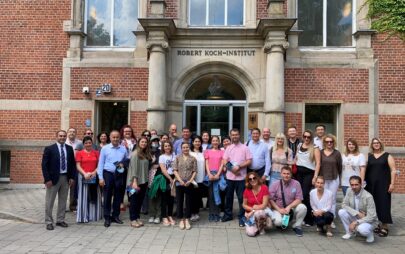BoCO-19 – Corona Global: Burden of COVID-19
The Burden of Disease due to COVID-19: Towards a Harmonization of Population Health Metrics for the Surveillance of Dynamic Outbreaks

Short Description
COVID-19 strongly affects the living conditions of people, showing the value of reliable and timely information. The burden of disease (BoD) methodology is a suitable instrument to monitor the impact of the COVID-19 pandemic on population health, but while illness and death impose a considerable impact, the disease has not yet been incorporated into the standard BoD methodology. Rather, the implementation of methods so far faces unsolved challenges limiting its usability for the surveillance of the pandemic. Thus, the overall aim of BoCO-19 is the development and implementation of a harmonized methodology for the timely provision of information on the BoD due to COVID-19. BoD methods for Germany have been developed at the Robert Koch Institute (RKI) within the BURDEN 2020 project. First steps have also been taken to measure the BoD due to COVID-19 and are currently discussed within the EU COST Action European Burden of Disease network (burden-eu COST Action). BoCO-19, which is a trilateral cooperation between Germany, 13 partners and the burden-eu COST Action goes much more into depth and tackles the main methodological challenges via four work packages (WPs):
- WP 1 institutionalising the network, clarifying country specific needs and assessing available data sources
- WP 2 concerting a methodology, including a case definition
- WP 3 preparing the available data, applying the methods to the data and consolidating the results
- WP 4 finalising a manual, preparing scientific publications and providing a visualisation of the findings
Next to partners from the burden-EU COST action, two partners will also take on the task of a regional contact point for the partner organisations. Once Serbia for South-East Europe and Turkey, the second from Kazakhstan will coordinate the partners from the post-Soviet states and Mongolia. Governmental bodies, university institutes and NGOs from Albania, Azerbaijan, Bosnia and Herzegovina, Georgia, Kazakhstan, Kosovo*, Kyrgyzstan, Mongolia, Montenegro, Serbia, Turkey, Ukraine and Uzbekistan have expressed their willingness to actively participate.
Project Objectives
The objective of BoCO-19 is to review the existing approaches and to apply a consistent methodology considering country-specific conditions such as the level of detail of the available information and the data accessibility. In addition to an inventory of the available data sources, the project consists of online meetings and a total of four workshops aiming to calculate BoD indicators for COVID-19 for all partners. In addition to assessing the disease burden for an entire calendar year, the example of COVID-19 will also be used to explore ways of making the method usable for timely surveillance.
- International scientific networking with thirteen participating international partners, linked to the EU-funded COST Action CA18218 European Burden of Disease Network
- Development of a harmonised methodology via workshops to consolidate and synthesise applied methods
- Implementation of BoD indicators within the countries. Calculating the BoD due to COVID-19 for all partners and pilot an approach to achieve a ready-to-use, consensual methodology for the integration of BoD-indicators into the surveillance of dynamic outbreaks and serve as a blueprint for future pandemics
- Dissemination of methodology and results. Overview and assessment of existing data sources, an article on applied and harmonised methodology, a (generic) manual for integrating indicators into country-specific surveillance systems and integrate BoD indicators for COVID-19 in a visualisation tool
* This designation is without prejudice to positions on status, and is in line with UNSC 1244 and the ICJ Opinion on the Kosovo Declaration of Independence
In Cooperation with
Last update: December 2022
